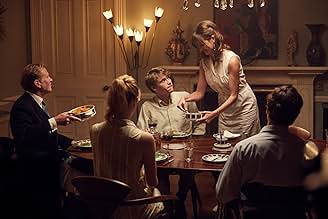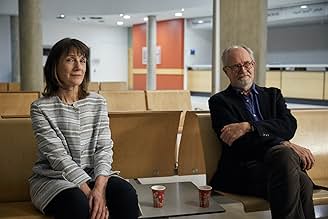The Sense of an Ending
- 2017
- Tous publics
- 1h 48m
A man becomes haunted by his past and is presented with a mysterious legacy that causes him to re-think his current situation in life.A man becomes haunted by his past and is presented with a mysterious legacy that causes him to re-think his current situation in life.A man becomes haunted by his past and is presented with a mysterious legacy that causes him to re-think his current situation in life.
- Awards
- 1 win total
Featured reviews
Jim Broadbent is one of the greatest actors of the late 20th and early 21st Century. I've seen him in many films, and he always inhabits his role as if he were, indeed, that person. Dame Margaret Webster is a fine actor, and has appeared in dozens of movies and made-for-TV specials. However, I think the only time I've seen her on screen was as the vile Fanny Dashwood in Sense and Sensibility (1995). She does a highly professional job as a embittered woman, whose life is absorbed by her business interests.
Michelle Dockery looks as if she just changed costumes and walked into this movie from Downton Abbey. She is always angry and depressed. For the record, her part is small and non-central in this film. I think she wants to broaden her range, but that didn't happen here. Could she ever star in a comedy?
Charlotte Rampling was one of the most beautiful women in movies. At age 70, she still is one of the most beautiful women in movies. She is not only beautiful, but she is a consummate actor who is made for this role.
This film is complicated. About 75% of it takes place in present time, and about 20% takes place in flashback. (The other 5% are dream and imaginary scenes, when the present enters into the past.) You'll have to pay close attention or you'll miss the point. In fact, during the middle of the film, I missed the point. However, towards the end, it all came together and made sense.
(Incidentally, there's a tedious sequence in the beginning, when Tony gets a certified letter, and he almost opens it, then he sort of opens it, then he opens it and doesn't read it, and finally, finally reads it. The letters starts off the entire plot, so he needs to read it, and we need to know what it says. That's the only weak part of the movie.)
We saw this film at the excellent Little Theatre in Rochester, NY. Even though it's meant to be seen on the large screen, it will work well on the small screen. This movie has a ridiculously low IMDb rating of 6.5. It's much better than that. This is one of those ratings that you have to ignore. Don't miss this movie just because it's rated so low.
P.S. Relevant to The Sense of an Ending: The Moving Finger writes; and, having writ, Moves on: nor all thy Piety nor Wit. Shall lure it back to cancel half a Line, Nor all thy Tears wash out a Word of it." From the Rubaiyat of Omar Khayyam.
From flashbacks to the 1960s, we learn he was involved with a lass called Veronica and met Adrian, a charismatic student. A thoughtless act leads to, or may not have led to, tragedy.
How much of Tom's history (shown in the flashbacks) is true and how much is a distortion of his memory, is open to question.
Meanwhile, Tom's life in the present continues. His daughter is close to giving birth which means regular meetings with his former wife. This gives Tom an opportunity to discuss the past. By staying alert and listening in to the conversations closely and watching the flashbacks carefully, clues emerge for us to discern the truth.
Six fellow film fans and I saw the movie together and met for lunch afterwards. Our interpretations differed. An indication that we'd seen an exceptional film.
There were things we agreed on: the ensemble cast was outstanding; the editing was first-rate; the music unobtrusive; and the director's touch admirable.
Various actions of the major characters and possible actions not actually shown on screen were raised and analysed with the results agreed to by some, rejected by others.
It's not a film for everyone but for those who enjoy a movie where clues are given but interpretations are left to the viewer, this one's for you.
It's a movie that stays with you for days.
Tony Webster (Jim Broadbent) is a disagreeable, semi-retired 70-something curmudgeon living in London. He used to make his living as a doctor, but now he owns a small vintage camera shop. Tony is long divorced from Margaret Webster (Harriet Walker), but they remain quite friendly, mutually supporting their pregnant single daughter, Susie (Michelle Dockery from TV's "Downton Abbey"), and sometimes meeting to discuss their lives over a spot of tea. Obviously comfortable (if not entirely happy) living out the narrative of his life (as he sees it), Tony is about to be shaken out of his complacency.
Dr. Webster receives a letter informing him that he has been bequeathed an old diary by the recently departed mother of his college girlfriend. Questions abound. Tony wants to know whose diary it is. When he tells his ex-wife about the letter, she's curious why the mother of a long-lost love would be leaving him anything in her will. As Tony struggles with the family's lawyer to get his hands on the diary (or at least get some answers), he begins telling Margaret stories from a past that he has never before shared. She gets frustrated when she senses that he isn't telling her the whole story, while the audience is left to wonder what he's leaving out, why he's leaving things out and if he even realizes he's doing it.
Tony's story slowly unfolds (and is later revisited and built upon) in flashbacks throughout the movie. As a young man, Tony (played during his school days and college years by Billy Howle) begins dating the young, fetching and quirky Veronica Ford (Freya Mavor). As they figure out how they really feel about each other and where their relationship is going, Tony spends a weekend at her family's country cottage, where Tony hits it off with Veronica's mother, Sarah (Emily Mortimer). Eventually (not a spoiler – it's in the theatrical trailer), young Tony's best friend, the very intelligent but very maudlin Adrian Finn (Joe Alwyn) emerges as a rival for Veronica's affections. As a mystery unravels both in old Tony's rearview mirror and in his present, he finds old Veronica (Charlotte Rampling) and demands answers.
"The Sense of an Ending" is a relatable, entertaining and thought-provoking character-driven drama. This impressive collection of English thespians all give heart-felt and layered performances, while Nick Payne's script and Ritesh Batra's direction sensitively and insightfully develop the story, but still leave room for individual interpretations. How a person sees this film will have as much to do with his or her age, perceptions and individual experiences as the story itself. And when all is said and done, the film's ending still leaves room for discussion among Movie Fans. Rather than a clearly defined ending, we get the sense of an ending. Or is it a beginning? It's for each of you to decide for yourselves. Getting there does require you to go along for the ride on a slow-moving cinematic train, but it's well worth the journey – especially since you may be surprised where you end up. "A-"
"When we are young, we want emotions to be like what we read in books". So says the narrator and lead character Tony Webster (as played by Jim Broadbent). Tony runs a tiny second hand camera store (specializing in Leica models) while leading a mostly benign life – rising daily at 7:00am, coffee with his ex-wife, and periodic errands for his pregnant daughter. One day a certified letter arrives notifying him that he has been named in the Last Will and Testament of the mother of a girl he dated while at University. And so begins the trek back through Tony's history and memories.
Of course, a film version can never quite cut as deeply as a novel, but this preeminent cast works wonders in less than two hours. Curmudgeonly Tony is accessible and somewhat sympathetic thanks to the stellar work of Mr. Broadbent, who always seems to find the real person within his characters. Harriet Walther ("The Crown") turns in a tremendous performance as Margaret, Tony's most patient and quite wise ex-wife. Michelle Dockery ("Downton Abbey") is their pregnant 36 year old daughter Susie, and just these three characters could have provided a most interesting story. The film's best scenes feature the comfort and familiarity of a once-married couple, as Tony and Harriet talk through previously never mentioned topics. However, there is so much more to explore here as Tony's thoughts bring the past splashing right smack dab into the present.
Billy Howle does a nice job as young Tony, an aspiring poet, who falls hard for the enigmatic Veronica (Freya Mavor). Complications arise when Tony spends a weekend with Veronica at her parents' estate. It's here that Emily Mortimer energizes things (and clouds thoughts) with minimal screen time as Veronica's mother. It's also around this time where new student Adrian Finn (played by Joe Alwyn of Billy Lynn's Long Halftime Walk) captures Tony's imagination and a friendship bond is formed only to be later shattered in a most painful manner.
There is so much going on that director Batra's (The Lunchbox, 2013) low-key approach is often misleading. Looking back on one's life can lead to the twisted version that our mind has edited/revised in order to make things seem better or worse – definitely more colorful – than they likely were at the time. Tony's distorted view of history crumbles when documented proof of his actions is presented at his first face to face meeting with Veronica (the great Charlotte Rampling) in five decades. It's at this point that regret and guilt rise up, and the only question remaining is whether this elderly man can overcome his repressed emotions and self-centeredness in order to make the best of what time he has left. Each of us has a life journey, and though few of us ever actually tell the story, there are undoubtedly numerous lessons to be had with an honest look back.
Did you know
- TriviaAt a festival screening in San Francisco, Ritesh Batra said that he had tea with Julian Barnes, author of The Sense of an Ending, ahead of filming. Batra was so nervous at meeting Barnes that he subsequently forgot most of their conversation, save for Barnes's parting line, spoken in jest: "Go ahead and betray me."
- GoofsYoung Tony affixes a 'first-class' stamp to his fateful letter, sent in 1967. This sort of stamp was not produced for another 26 years (in 1993).
- Quotes
Tony Webster: [Voice over] When you are young you want your emotions to be like the ones you read about in books. You want them to overturn your life and create a new reality. But as that second hand insists on speeding up and time delivers us all too quickly into middle age and then old age, that's when you want something a little milder, don't you? You want your emotions to support your life as it has become. You want them to tell you that everything is going to be okay. And is there anything wrong with that?
- ConnectionsFeatured in Power of Memory: Making 'The Sense of an Ending' (2017)
- SoundtracksPsychotic Reaction
Written by Sean Byrne (as J. Byrne) / John Michalski (as J. Michalski) / Craig Atkinson (as C. Atkinson) / Ken Ellner (as K. Ellner) / Roy Chaney' (as R. Chaney)
Performed by Count Five
Published by Bucks Music Group Ltd / The Bicycle Music Company
Licensed courtesy of The Bicycle Music Company
- How long is The Sense of an Ending?Powered by Alexa
Details
- Release date
- Countries of origin
- Official site
- Language
- Also known as
- À l'heure des souvenirs
- Filming locations
- Production companies
- See more company credits at IMDbPro
Box office
- Gross US & Canada
- $1,274,420
- Opening weekend US & Canada
- $39,692
- Mar 12, 2017
- Gross worldwide
- $5,081,495
- Runtime1 hour 48 minutes
- Color
- Sound mix
- Aspect ratio
- 2.35 : 1
Contribute to this page











































